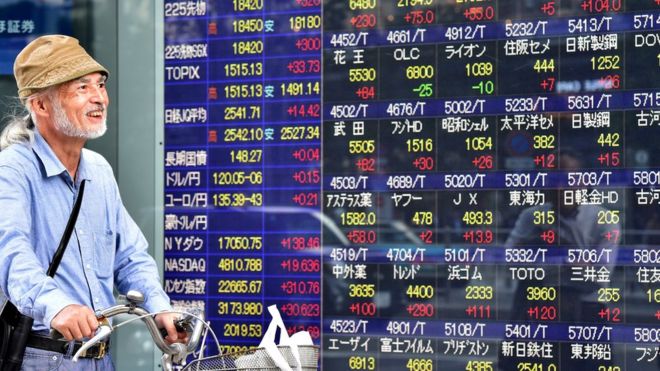
Feb 7, 2018
An early rally for Asia stocks faltered on Wednesday with some markets slipping into negative territory despite a strong lead from Wall Street.
Japan’s Nikkei 225 index pulled back from early highs to add 0.2%, while Hong Kong’s Hang Seng lost 0.8%.
The moves in Asia followed choppy US trading which ended with the Dow Jones Industrial Average rising 2.3%.
Analysts said investors hunting for bargains in the wake of heavy sell-offs on world markets helped drive gains.
Elsewhere in Asia on Wednesday, Australia’s S&P/ASX 200 ended up 0.8% while South Korea’s Kospi index dropped 2.3%.
Traders started the day on a strong note following a rally on Wall Street. The Nasdaq closed up 2.1% and the S&P 500 rose 1.7%.
That brought relief to markets after a global sell-off began last week.
Investors dumped stocks after a solid US jobs report fuelled expectations that the economy’s strength would prompt the Federal Reserve to raise interest rates faster than expected.
The report came amid other shifts, including new tax cuts, trade tensions, and a sinking dollar, that analysts say could lead inflation to rise faster than expected.
On Monday, the Dow plunged by nearly 1,200 points or 4.6%, triggering follow-on losses in Asia and Europe.
The decline was the largest in percentage terms for the Dow since August 2011, when markets dropped in the aftermath of “Black Monday” – the day Standard & Poor’s downgraded its credit rating of the US.
What is the outlook for markets?
Stock markets in Asia and the US have been sitting at record levels and analysts have said for months a correction was due.
“Many view the [recent] downturn as a necessity to the runaway equity markets and see it as an opportunity for investors to reinvest at more manageable levels,” CMC Markets analyst Oriano Lizza said.
Analysts say that in the short term, investors should be prepared for choppier stock markets, but doubt whether there will be a prolonged period of selling.
“What we have to remember is stock markets have had a very smooth ride upwards and we’ve not had a fall of more than 3% for 15 months. There’s been a real lack of volatility, which is very unusual,” said Jane Sydenham, investment director at the stockbrokers Rathbones.
She added that bear markets – when shares go into a long period of decline – tend to happen ahead of a recession and at the moment growth forecasts were being upgraded.










